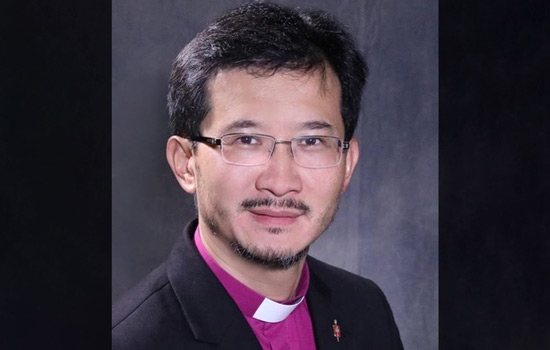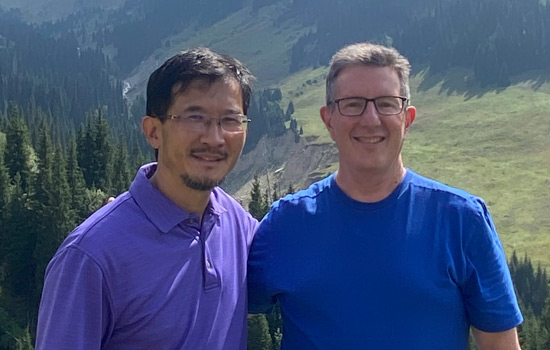Copyright © TMS Global
TMS Global
PO Box 936559
Atlanta, GA 31193-6559
800.478.8963
Our EIN number or Taxpayer Identification Number is 58-1546441.

February 24th marked the one-year anniversary of the war between Russia and Ukraine.
Bishop Eduard Khegay is the resident bishop of the Eurasia Episcopal Area in the Northern Europe and Eurasia Central Conference of The United Methodist Church. He lives in Moscow and serves churches in several countries of the former Soviet Union, including Russia, Kazakhstan, Kyrgyzstan, and Belarus. Until last spring, his area also covered Ukraine. Ukraine is now with the Nordic and Baltic Episcopal region.
Bishop Khegay also sits on the board of directors for TMS Global. He recently spoke with TMS Global about what it’s been like to serve the Body of Christ in a time of deep division.
What has it been like to serve the Body of Christ in these places that are currently at war with each other?
This war is probably the worst nightmare of my life. People are dying in Ukraine. I'm a Russian citizen and I'm ashamed of this war, but most Russian citizens do support the Russian operation. It's a complex situation. Even people in my churches in Russia are divided. The majority support the operation and some people don't.
Some churches have a hard time staying together and reconciling. People just don't talk to each other about this topic. It is painful. And it is painful to watch the relationship between Russian and Ukrainian Christians on social media, the way they keep blaming each other and attacking each other instead of helping each other. I've never seen that before.
How can Christians model unity in the Church while living in a world with conflict?
I read the gospel and see teachings of Jesus about humility and solidarity and love and forgiveness. This is the time when we can put those teachings into practice in a very real way. If I don't have humility, I think I'm right and everybody else is wrong. But if I practice humility, then we can sit at the table and learn from each other.
As a result of the war, churches in Russia and Ukraine have become more nationalistic.
And I don't believe in the national church. I believe in a Christian Church, universal. That's in the Apostles’ Creed. But it feels painful to practice being a unified Church now. Sooner or later, we need to send our friends and sisters and brothers to visit each other and try to build bridges. It's going to be painful. But the Body of Christ must work together.
I feel very blessed to be connected to the worldwide Church. I receive a lot of messages and have a lot of conversations with people around the world who pray for us and show their compassion in other ways. That’s encouraging for us as Christians in Russia and I'm sure in Ukraine. People do want to send offerings, raise funds, and do works of mercy and help people with food or clothes and whatever needs they have. There are refugees from Ukraine and Russia in many different countries now. They are all in need. I'm glad we have churches in those places where people can find love and support and encouragement.
Why is it important to listen to those with different perspectives?
If you look at the media now, there is propaganda everywhere. The different sides show only the negative stuff about each other. And I think that's the danger of the modern world and social media and mass media. If you live in Russia and watch TV for a year, you will hate everybody in the West. And I think if you live in America and watch TV, you will hate everybody in Russia.
That's a very sad situation. I think that's why we as Christians need to keep in touch with each other and tell each other our stories. That way, we will understand that it's not all just black and white. It's a very mixed bag of nuances and geopolitics. And we are, first of all, Christians and citizens of the kingdom of heaven. And I think in Christ we have more of a chance to build a foundation and common ground. If we can do that, I think there is much more hope for the world. If Christians can talk with each other with attitudes of humility, solidarity, love, and forgiveness there is a chance that we can practice unity.
What spiritual practices have become more important to you during this time?
The common prayer has been important for me. We pray individually, but praying together has been important. I think during this year especially, there were more online meetings with pastors and lay leaders praying and fasting together. We encourage people to practice fasting. In the Bible, there are many situations when the people of God were stuck, or in a difficult situation, and they were fasting and praying and crying out to God to help. It’s encouraging to not just fast by yourself, but to do it together with sisters and brothers in your country or in your area. That's Christian solidarity, which is very important.
I think it's also important to have psychological support groups like counseling.
Kitchen conversations and small group conversations also help us to touch base with others and share the burden and the suffering. Those conversations have certainly helped me. Finding support and places where I could share what was on my heart has been important.
I’ve also read some books with others like Dietrich Bonhoeffer’s books and his biography. And we read Hannah Arendt’s writings on the banality of evil. Arendt’s work reminds us that we need to be alert and check our conscience. We need to help each other because if we keep to ourselves, we can be used by the political system for ill purposes.
What are you hopeful for?
I keep preaching on hope, even though I myself need more hope. But what gives me hope is that I try to imagine the future. I imagine myself advocating for, and maybe facilitating, peace dialogs between Ukrainian and Russian people, between Russian and Russian people, between Russian and American people, where we can share our stories and our pains. These talks can allow us to open up and disassemble our stereotypes. We can see each other's blind spots and forgive each other at the foot of the cross of Christ. We can help each other to accept one another for who we are. I think that work is needed.
Even today in my churches in Russia, some people say, “Bishop, let's not touch this topic of war. No more about the conflict with Ukraine.” And I and I say, “No, we need to talk about it, and we need to reconcile with each other, first in our churches.”
If we as Christians cannot do that, then what's the hope for the world? So my hope is to facilitate those peaceful dialogs. It would be risky and painful. But my hope is that they could bring healing and reconciliation and clarity about where we stand and what we believe in. In other words, dialogs like these could also help us to think more intentionally about what it means to be a Christian today. That's my hope. I'm also hoping I can be a good shepherd for my people.
We are people of hope and faith. We go by faith. We may not see, but we believe.
I also have hopes that we would devote ourselves to works of mercy. We have refugees in Europe from Ukraine. We have refugees from Ukraine in Russia. And they need help. Instead of just staying in a state of depression and hopelessness, I think it's important for us to direct our energy and attention to others who are in need. We suffer maybe spiritually and morally, but physically we don't have any problems living in Russia now, so we must help those in need.
And I think when we serve others Christ transforms our hearts and lives.
What does a unified Church in a divided world look like to you?
It's like a big, extended family.
I have 20 cousins in Kazakhstan, and we gather together at certain family events. And like in big relative circles, there are always one or two who you are not comfortable staying with. But the important thing is to keep the conversation going. We may not resolve all the issues between us. In a family, we realize this person may or may not change. We don't know. The same is true in the Church.
But as Christians we are called to love, and love can unify us. We may strongly disagree theologically. We may be separating structurally. We may be on different sides politically. But can we all have Christian love? I think that's how the Bible says others will know that we are Christians.
I think 2022 was probably the most challenging year, at least in my life, where the practice of Christian love was tested. When the world sees how we treat each other on social media, do they see love or not? Where Russian and Ukrainians and Americans meet together, do other people see Christian love or not? I think that's the basis of our unity. Again, It's like a family. We may not agree on all points. But if we have love, we can continue to stay together and grow together.
